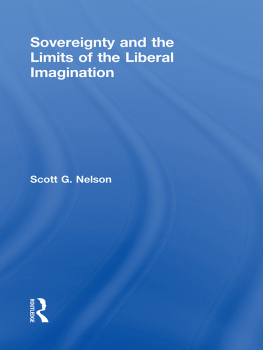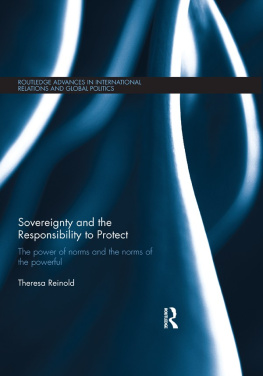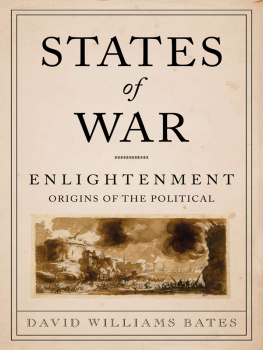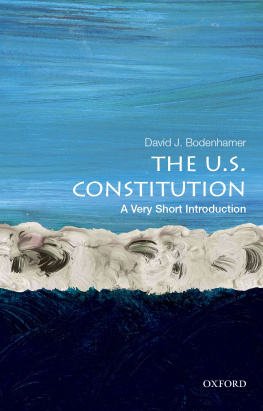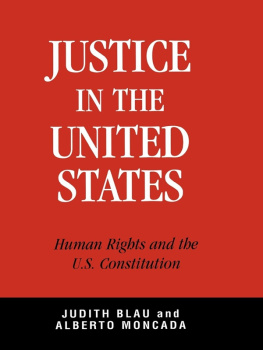States of War
COLUMBIA STUDIES IN POLITICAL THOUGHT/POLITICAL HISTORY
COLUMBIA STUDIES IN POLITICAL THOUGHT/POLITICAL HISTORY
Dick Howard, General Editor
Columbia Studies in Political Thought/Political History is a series dedicated to exploring the possibilities for democratic initiative and the revitalization of politics in the wake of the exhaustion of twentieth-century ideological isms. By taking a historical approach to the politics of ideas about power, governance, and the just society, this series seeks to foster and illuminate new political spaces for human action and choice.
Pierre Rosanvallon, Democracy Past and Future, edited by Samuel Moyn (2006)
Claude Lefort, Complications: Communism and the Dilemmas of Democracy, translated by Julian Bourg (2007)
Benjamin R. Barber, The Truth of Power: Intellectual Affairs in the Clinton White House (2008)
Andrew Arato, Constitution Making Under Occupation: The Politics of Imposed Revolution in Iraq (2009)
Dick Howard, The Primacy of the Political: A History of Political Thought from the Greeks to the French and American Revolution (2010)
Robert Meister, After Evil: Human Rights Discourse in the Twenty-first Century (2011)
Paul W. Kahn, Political Theology: Four New Chapters on the Concept of Sovereignty (2011)
Stephen Eric Bronner, Socialism Unbound: Principles, Practices, and Prospects (2011)
David William Bates
STATES OF WAR
Enlightenment Origins of the Political


Columbia University Press
Publishers Since 1893
New York Chichester, West Sussex
cup.columbia.edu
Copyright 2012 Columbia University Press
All rights reserved
E-ISBN: 978-0-281-52866-5
Library of Congress Cataloging-in-Publication Data
Bates, David William.
States of war : Enlightenment origins of the political / David William Bates.
p. cm. (Columbia studies in political thought/political history)
Includes bibliographical references and index.
ISBN 978-0-231-15804-6 (cloth : alk. paper) ISBN 978-0-231-15805-3 (pbk. : alk. paper) ISBN 978-0-231-52866-5 (e-book)
1. State, TheHistory18th century. 2. SovereigntyHistory18th century. 3. Natural lawHistory18th century. 4. War (International law)History18th century. 5. Enlightenment. I. Title.
JC171.B38 2012
320.109033dc22 2011008695
A Columbia University Press E-book.
CUP would be pleased to hear about your reading experience with this e-book at .
References to Internet Web sites (URLs) were accurate at the time of writing. Neither the author nor Columbia University Press is responsible for URLs that may have expired or changed since the manuscript was prepared.
To the memory of my father,
George William Bates
(19302009)

Contents
Dick Howard, Series Editor
THE QUESTION that motivates David Batess reconsideration of Enlightenment origins of the political is found in actual dilemmas facing contemporary political practice and its theory. His analysis concludes with a brief demonstration of how this historical reconstruction can offer more convincing answers to these questions than those proposed by Carl Schmitt and his heirs, including contemporaries such as Jacques Derrida, tienne Balibar, Jacques Rancire, or Jean-Luc Nancy. Between these contemporary bookends, Bates proposes a conceptual rereading of some of the landmarks of Enlightenment thought that is grounded in an understanding of how historical context affects theories that seek to explain it. Batess title refers not to some mythical historical construct called the Enlightenment; his argument is more perspicacious and nuanced. For this reason, too, it fits well the framework of this series, Political Thought/Political History. Questions posed in our present illuminate the past, which in turn both casts light and demarcates shadows that were not perceived by practical-minded political actors.
This same structure of reciprocal influence can be seen in the progress from chapter to chapter and even from subsection to subsection. Batess historical claim is that the political emerges in a specific historical conjuncture, but it doesnt emerge full blown, like a racehorse wearing its own theoretical colors, so to speak. This is the burden of his first chapter, which sets the practical and theoretical stage on which an autonomous state first appears and then gropes for the source of its legitimacy by defining the political. The guiding thread of the book can be put in terms familiar to a modern reader: What is the relationship between the sovereignty of the state and the laws that effectively (or in principle) restrain the potential arbitrariness of sovereign power, particularly when the state faces problems that appear to threaten its very existence? This existential dilemma, which emerges precisely when and where the law is no longer effective, leads Carl Schmitt and even his critical followers to define the political as control over the state of exception. David Bates does not shy away from the dilemma or fudge the difficulties that it entails; he proposes to rethink its origins and thus to radicalize its weight.
The fine examples of close textual reading offered by the four chapters that constitute the heart of the book propose a historical-conceptual progression through which the concept of the political (and its relation to law) is enlarged and developed. This brief foreword cannot do justice, for example, to Batess lucid account of the differences among the earlier theories of Hugo Grotius, Thomas Hobbes, and Samuel von Pufendorf and the way in which the latter provides the (social) grounds on which John Locke will inscribe his own vision of the parameters of the political (as opposed to the idea that the English Whig was replying to Hobbesian absolutism). A foreword can only call attention, for example, to the way Locke, and then Montesquieu, are read against themselves to provide new understandings of the questions that underlie their own theories. The reader will discover this, and more, soon enough.
A final point should be mentioned concerning the place of this study of enlightenment origins of the political within the framework of the series Political Thought/Political History. Bates denies that the concept of an autonomous political sphere is... a transhistorical category. He insists that it emerges at a very specific juncture in European history, which was conceptually established in the wake of [the 1648 Peace of ] Westphalia. It is important to read this claim clearly; the autonomous political sphere to which Bates refers can be seen as one explicitly modern definition of the political. For this reason, Batess claim does not contradict the broader theses proposed in my historical study The Primacy of the Political (2010). Indeed, Batess interpretation of what he considers to be the fully developed concept of the political, which he finds in Jean-Jacques Rousseau, suggests that a fully autonomous political sphere is compatible with the rule of law. This interpretation is similar to what I call a republican democracythat is, an institutional structure in which the republican form of the political ensures and secures a framework within which the active web of social relations (similar to Batess idea of the



